Crypto hack attacks, banning stock trading in Congress, and J.Crew cool again? Welcome to 'Nightcap'
This story is part of CNN Business’ Nightcap newsletter. To get it in your inbox, sign up for free, here.
London (CNN Business)Last year was a busy, chaotic one on Wall Street. Mergers, acquisitions and new stock listings were going a mile a minute, underpinned by a generally jolly mood. The economy was bouncing back. Vaccines dimmed the risks posed by Covid. Money was essentially free to borrow. There was a war for talent among banks. Champagne for all!
All of that activity meant long, stressful hours for bankers. But that’s part of the bargain on Wall Street: Work until you nearly collapse and wait for your lavish bonus check to hit your bank account.
See here: The average Wall Street bonus for 2021 hit a record high of $257,500, up 20% from the year before, according to estimates by New York State Comptroller. (Just to be clear: That’s a bonus figure, not a base pay. So, yeah, we’re not exactly calling for a GoFundMe for these guys.)
This year, though, it’s a very different story.
Anyone expecting the same kind of cushy bonus is in for disappointment. Bonus pay on Wall Street is getting significantly reined in this year as deal volume dries up, fueling concerns that banks will lay off staff the end of the year.
A new report from consulting firm Johnson Associates forecasts that year-end bonus pay will decline across financial services, with some bankers seeing bonuses gutted by 45% or more from last year.
“It’s been a real shock,” Alan Johnson, managing director of the firm, told me. “I don’t think any of us really appreciated how much the pandemic stimulus created a bubble … now the lights have come on and it’s a little ugly.”
The differences between 2022 and 2021 are stark, to say the least. We went from a bull market to a bear market. From a dovish Fed that spiked the proverbial punch bowl to a hawkish one that’s trying to sober everyone up with higher interest rates.
Financial institutions are having to tighten their belts a bit more rapidly than they may have anticipated. The number of global initial public offerings dropped by 54% in the first half of this year compared with 2021, my colleague Julia Horowitz reported earlier this summer. Mergers and acquisitions fell 25%.
That’s bad news for banks, which typically make much of their revenue from putting deals together. Investment banking revenue at JPMorgan Chase fell 61% last quarter. At Morgan Stanley, it fell 55%.
Of course, Johnson says, these firms are still very profitable. “They went from making two tons of money, now they’re going to make one ton of money,” he tells me. “But it’s still a ton of money.”
It’s no surprise that Wall Street bonuses should wax and wane with the fate of the markets. But what’s shocking to Johnson is how fast the tables turned this year. Banks that went on hiring sprees in the boomtimes of 2021 are in a bind now, likely realizing in hindsight they overstaffed.
“There will be layoffs — not massive layoffs, but I they’ll certainly be layoffs at the end of the year,” Johnson says.
Of course, no one’s celebrating the prospect of handing out pink slips or scaling back pay. But neither is anyone throwing a pity party for the well-to-do Wall Streeters who are about to get haircut.
“The problems here are of course dwarfed by the problems of people in real world,” Johnson says. “It’s bad when your bonus goes for a $1 million to $600,000, but that’s still $600,000.”
Enjoying Nightcap? Sign up and you’ll get all of this, plus some other funny stuff we liked on the internet, in your inbox every night. (OK, most nights — we believe in a four-day work week around here.)
Source: Read Full Article

